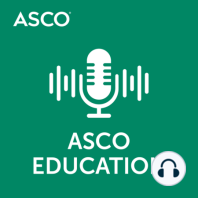6 min listen
Oncology, Etc. – In Conversation with Dr. David Steensma (Part 2)
FromASCO Education
ratings:
Length:
18 minutes
Released:
Nov 15, 2022
Format:
Podcast episode
Description
In Part Two of this Oncology, Etc. episode, hosts Patrick Loehrer and David Johnson continue their chat with hematologist-oncologist Dr. David Steensma. They explore his views of key opinion leaders and a lifelong passion – collecting rare stamps, including medical stamps. If you liked this episode, please subscribe. Learn more at https://education.asco.org, or email us at education@asco.org. TRANSCRIPT Pat Loehrer: Hi, I'm Pat Loehrer, Director of Global Oncology and Health Equity at Indiana University. I'm here with Dave Johnson, a Medical Oncologist from The University of Texas, Southwestern in Dallas, Texas. Welcome to the second half of our Oncology, Etc. conversation with Dr. David Steensma. He's a highly accomplished physician and scientist in the field of Hematology/Oncology. In the first part of this episode, Dr. Steensma told us about his Dutch immigrant roots, and how a single college biology course changed his career interests from astronomy into medicine. Today, we'll explore his views on Key Opinion Leaders and another passion of his, and an interest of ours - collecting rare stamps, including medical stamps. Dave Johnson: So, David, in addition to your scientific writing, you've been a prolific writer in many other sort of viewpoints and opinion pieces. There's a lot to choose from, but I know you've been interviewed in the past about your column called ‘The Raven’, which I won't ask you about, as an Edgar Allen Poe fan. You also wrote a wonderful piece called, ‘Key Opinion Leaders’, which I thought might be quite interesting to ask you about, now that you might be calling upon KOLs. Do you want to tell us a little about that? Dr. David Steensma: Yeah, that's not my favorite term. Thought Leaders is another kind of silly term, but we know what we mean when people are talking about it. Yeah, I've had a chance to write on a lot of different things over the years, and that's been great fun. And when I first heard that term, I couldn't figure out what it meant, KOL. And then, a pharmaceutical representative actually accidentally left a list of KOLs in my office and I realized that not only are KOLs cultivated very carefully, those relationships, but there's a hierarchy of KOLs. They were people who influenced the local formulary and local practice at the institution, there were those who had a regional impact, and then there were those who were on the NCCN guideline committees, and had, you know, much broader impact that they really wanted to make sure to influence the heart and minds of-- in my interactions now, this opinion piece was a sort of tongue-in-cheek about Key Opinion Leaders and Thought Leaders. And with Thought Leaders, I was reminded of Sherlock Holmes’s brother Mycroft Holmes, who, by Conan Doyle's fiction, was a brilliant man, but unwilling to stir his ample backside from his Chair in the Diogenes Club to actually get out there, and do some real work, and solve mysteries. And so, it fell to his slightly less brilliant brother, Sherlock, to become the consulting detective. So, that was fun. Now, we're sort of on the receiving end of wisdom from people who are experts in the area. And it's very important what doctors think, and in different geographies about how they think their patients will be potentially treated in a year or two, five years down the road, what the issues they have with current approaches are, where they see opportunity for some of our new compounds, for some of those of other companies, and it's different in Europe versus the US versus Australia. And so, there's a lot that we gain from advisory boards. There's an arc to an advisory board. You don't want to convene an advisory board when there's no data, because then, everybody is just speculating. You don't want to do it too late after something is already on the doorstep of FDA approval because then not anything can be changed at that point. So, you know, doing it at an in-between point where there's some initial data, but where
Released:
Nov 15, 2022
Format:
Podcast episode
Titles in the series (100)
Self-Evaluation: NSCLC Treatment Metastatic: Self-Evaluation: NSCLC Treatment Metastatic by ASCO Education
